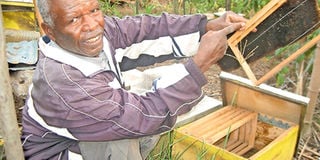Love for bees sweetens man’s life

Samuel Tangus, a bee farmer in Tendwet, Narok County. He notes that beekeeping is a profitable venture and urges other farmers with small pieces of land to venture into the business. PHOTO | PETER CHANGTOEK | NMG
What you need to know:
- Together with 14 others, who were interested in beekeeping, they received 10 modern beehives from the organisation.
- He was also lucky to be given other beehives by a neighbour who had his own apiary but was moving to another place.
- To avoid the wrath of the insects, Tangus harvests honey at night.
- He then sells the processed honey in 350ml containers at a price of Sh200, a price he has fixed himself since the commodity is rare there.
Samuel Tangus, a bee farmer in Tendwet, Narok County, is proof of the oft-quoted maxim “disability is not inability”.
Affected by polio at a tender age, Tangus has demonstrated great prowess in beekeeping, an activity he has carried out for almost three decades.
“I had a passion for beekeeping when I was young. I used to see my father bring honey home because he was a forest ranger. When I was in primary school, I loved bees, especially when I saw them in beehives,’’ says the man who grew up in Dundori, Nakuru County.
“I started beekeeping in 1994, using traditional beehives. In 2005, a wildlife conservation agency called WWF (World Wildlife Fund), came to Mulot and Segemian and taught us about the importance of conserving water catchment areas,’’ says Tangus, adding that the organisation taught them farming methods that do not involve digging of soil, that is, poultry keeping and bee keeping, among others.
Together with 14 others, who were interested in beekeeping, they received 10 modern beehives from the organisation.
Since he already had his five beehives, the members decided to place the new beehives in his farm. After some time, the other members quit and left the beehives to him.
“I did not want to abuse what the organisation had started for us, so I decided to go on with the project, doing research and reading books on bee farming,” says the farmer, adding that his son helped him research about beekeeping in Kenya and in other parts of the world.
THE COMMODITY IS RARE
He was also lucky to be given other beehives by a neighbour who had his own apiary but was moving to another place.
Currently, Tangus has 25 beehives, but those colonised by bees are 11. Apart from Langstroth beehives, the farmer also uses Kenya top bar hives (KTBH).
“I later realised that the management of the Kenya top bar hives is easy. Traditional beehives have a lot of disadvantages and they don’t produce quality honey,’’ explains the farmer, who also grows avocados.
To avoid the wrath of the insects, Tangus harvests honey at night.
“I harvest twice a year, but when the weather conditions are favourable, I can harvest even three times,’’ says the farmer. He harvests five litres of honey from a single Langstroth beehive.
He then sells the processed honey in 350ml containers at a price of Sh200, a price he has fixed himself since the commodity is rare there.
Tangus notes that beekeeping is a profitable venture and urges other farmers with small pieces of land to venture into the business.
“Anybody can start, even old people. Even when you are on a wheelchair, you can manage even a hundred beehives,’’ he says.
Tangus says if he gets support, he will volunteer to teach others, especially the physically challenged, about beekeeping.





